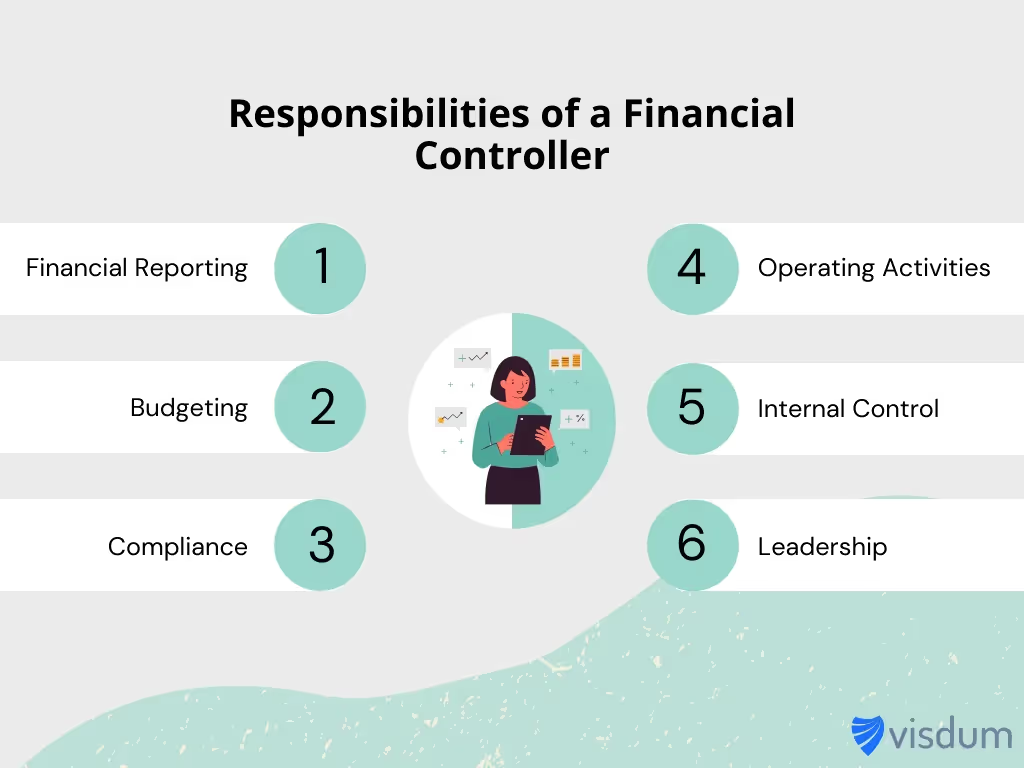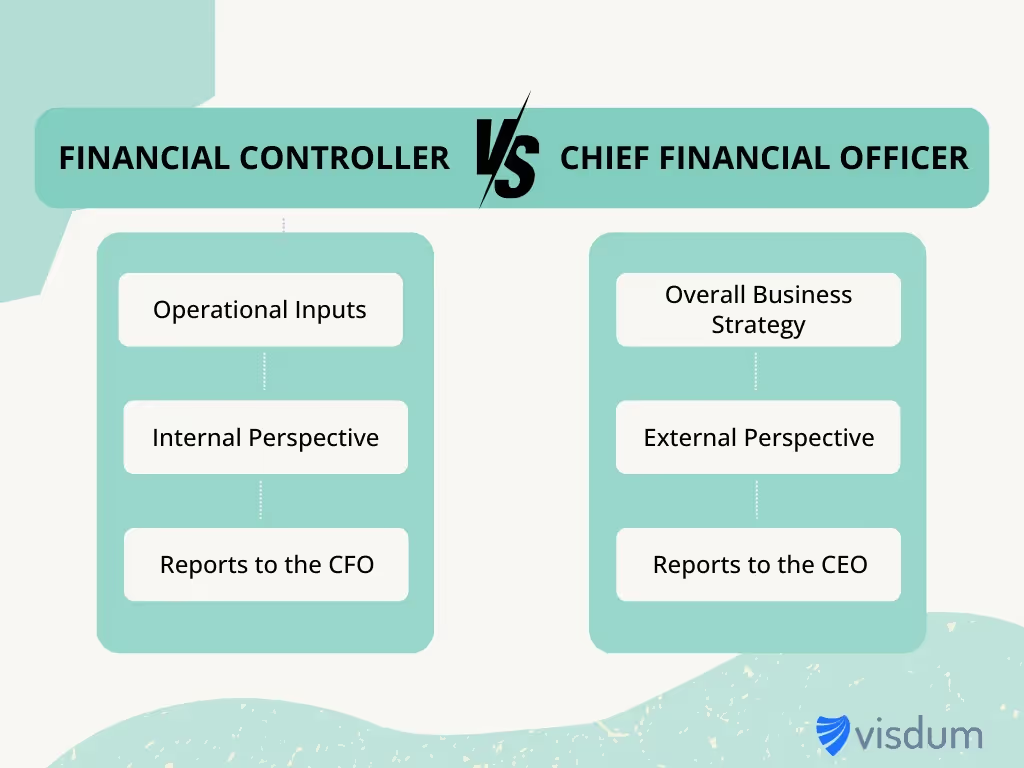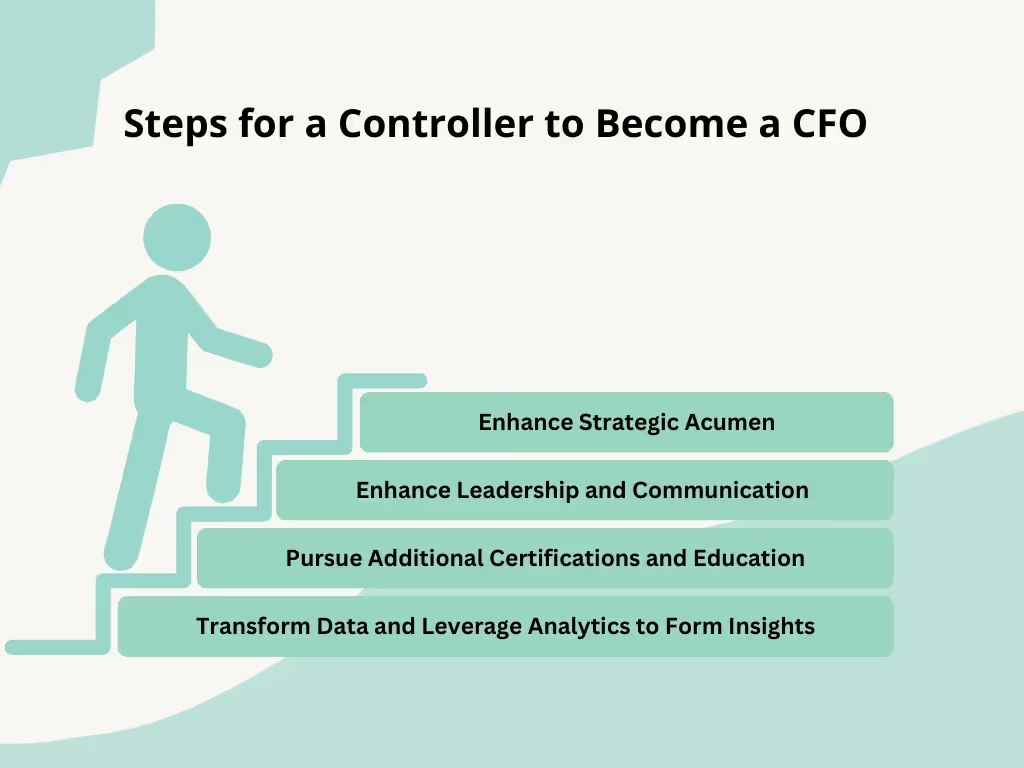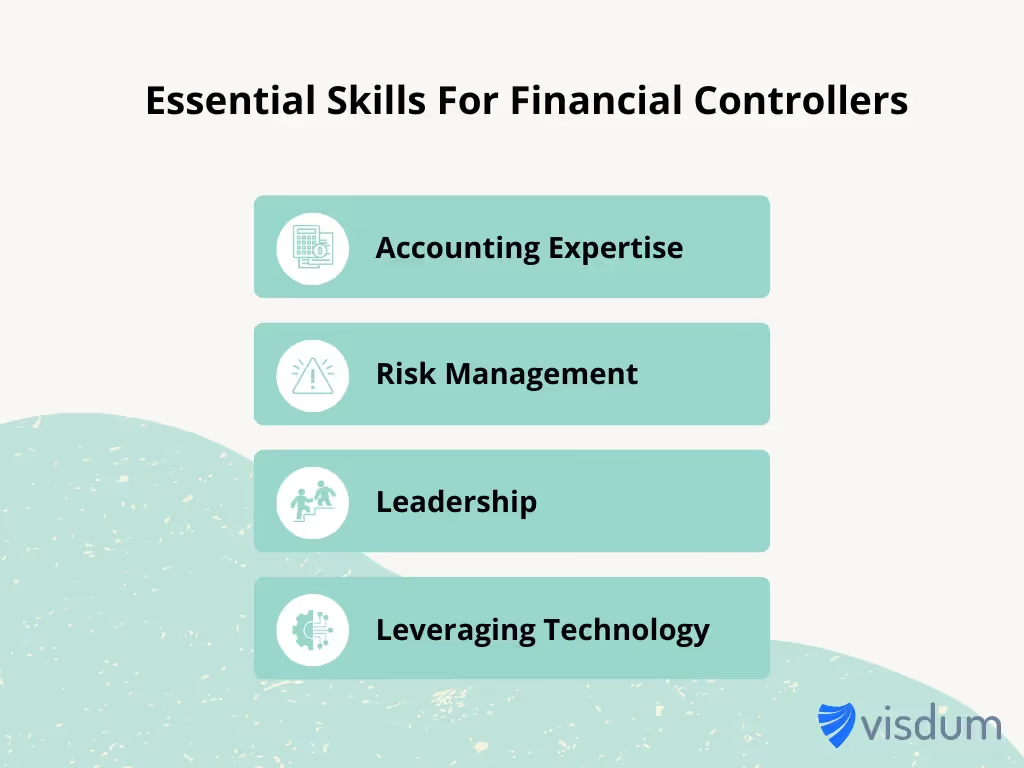Who is a Financial Controller? Controller vs CFO

The world of corporate finance is complex.
With intensive strategizing and the utmost degree of accuracy in numbers being a daily requirement, the inputs of a well-functioning finance unit take a lot of work to get right.
This often leads to companies being unable to clearly distinguish between key finance roles, and the responsibilities blur away, leading to inefficiencies in financial management. And anyone in corporate finance can tell you, if the numbers are down- you feel the same.
Two roles where the lines are often blurred are that of the Financial Controller (FC) and the Chief Financial Officer (CFO).
According to the 2021 Financial Hiring Guide by Robert Half, 71% of CFOs and senior financial executives view strong financial controls as essential for effective strategic decision-making. It’s the financial controllers that turn numbers into reliable and actionable intelligence.
In this blog, we will comprehensively cover the roles and responsibilities of the Financial Controller and what differentiates them from a Chief Financial Officer.
Who is a Financial Controller?
A Financial Controller is the lead accountant for any organization. They are ultimately responsible for all financial information produced by the company and are the ones who control all the internal accounting processes.
Their role can be summarized as being:
- Steward of all assets and their management
- Operator of the finance machinery
- Catalyst who ensures the timeliness of financial records, reports, and the implementation of control
- Strategist who ensures that financial numbers remain in favor of the organization
Financial Controllers ensure that there are no gaps in the financial processes, and consequently, no surprises. They are the backbone of accounting operations, overseeing audits, compliance issues, accounting controls, etc.
While the role is primarily defined by their controllership of financial data, it has been evolving to include more strategic inputs as well. Modern-day competition has forced more strategic inputs to be a part of key roles, but in terms of financial strategy, the CFO remains the final boss, so to speak. More about the evolution of financial controllership can be found in this report by Deloitte.
Financial Controller Roles and Responsibilities

The Financial Controller is the top-most finance authority in many firms and directly reports to the Chief Financial Officer (CFO) in organizations where there’s a CFO. The CFO’s strategy and financial outlook are based on the data that is provided by the controller. The exact responsibilities of a controller vary according to the size of the firm.
However, some of the core responsibilities of Financial Controllers include:
- Financial Reporting: The Financial Controller is tasked with collecting, analyzing, and summarizing financial data. Such reports are prepared for both internal and external stakeholders. It is up to the controller to analyze trends, investigate reasons for shortfalls, and recommend improvements to upper management. All the numbers are run through the controller. They are the authority on financial statements.
- Budgeting: A Financial Controller helps in the preparation of the annual budget, and the various departmental budgets. Any variances in these budgets and any revisions that need to be made are communicated by the controller to the upper management, mainly to the Chief Executive Officer and the CFO. Obviously, as the top brass of accounting and record-keeping, the controller controls all the budgets.
- Compliance: Compliance is a pressing issue that every organization needs to be on top of. Financial Controllers ensure that GAAP (Generally Accepted Accounting Principles) are evenly applied at all levels of accountancy.
Controllers also oversee regulatory compliance with all accounting standards, which instruct how to account for revenue recognition, depreciation, amortization, and other core accounting activities.

- Operating Activities: A Financial Controller is the day-to-day operations manager for finance. Payouts, reimbursement claims, invoices, order ledgers, etc. are kept in control and up-to-date by the controller through their oversight over the accounting department.
- Internal Control: A Financial Controller ensures that proper measures to guarantee the accuracy of financial data are in place and functioning. Controllers are also tasked with the assessment of risks in such systems, and consequently with improvements in efficiency and mitigation of risks.
- Leadership: The Financial Controller is the pinnacle of accounting and financial operations. Naturally, they don’t always get their hands dirty, but ensure that there is an efficient team that keeps everything up and running smoothly.
Controller vs CFO: Key Differences Between Controllers and CFOs

The CFO and the Financial Controller are often mixed up together. Well, the truth is that for most of the smaller companies, these two roles are performed by the same person, which is usually the controller.
As the business grows, so does the need for distinguishing these roles. While the CFO is the head of the finance department, the Financial Controller is the leader of financial operations.
The Role of Strategy
A key difference between a Financial Controller and a CFO is the strategic input they provide. While the CFO is focused on developing an overall business strategy, the controller’s role is more operational and tactical.
Picture it like this: The CFO is the head coach of a football team, and the controller is the captain on the field. The coach strategizes methods to win championships, while the captain keeps the team aligned to that strategy in actual matches.
A Difference in Perspective
As the organization grows, and the roles divulge, the CFO has to focus more on all the ‘external’ aspects of finance, such as investor relations, acquisition deals, communication with external stakeholders, etc.
On the other hand, the Financial Controller is the head of internal finance. Generation of GAAP-compliant financial statements, managing everyday financial transactions, overseeing financial processes, setting internal controls for accounting, etc. is on the controller’s plate.
Structural Hierarchy
The CFO has the highest financial role in any organization. They report directly to the CEO. On the other hand, the Financial Controller, along with the treasurer, reports directly to the CFO.
Financial Controllers can go on to become CFOs, and it is considered a desirable promotion for them.
How can a Controller Ascend to Become a CFO?

A CFO is at the pinnacle of all corporate finance roles. As you climb the financial corporate ladder, the CFO role becomes the ultimate goal. Financial Controllers are at the forefront of accountancy and financial data in a firm, and it is the natural next step for them to become Chief Financial Officers.
Here are some steps that can be taken by controllers to fast-track their jump from an FC to a CFO:
- Enhance Strategic Acumen
The CFO role requires evolution beyond mere numbers. It requires you to think from a greater business perspective and shape the company’s future. Consequently, It mandates a keen understanding of the competitive environment. Partaking in strategic decisions, finding a CFO mentor to guide you through strategy formation, and using your accounting expertise to align business goals with finance can help you propel your career.
Ruth Porat, an epitome of business acumen and one of the top women in finance, started as a controller at Morgan Stanley and soon climbed up to become the CFO at Alphabet, Google’s parent company.
- Leadership Beyond Control
As a Financial Controller, leading the accounting team may have been your bread-and-butter. However, A CFO role requires visionary leadership and excellent communication skills. You must learn how to inspire the folks around you, and your words should reflect deep financial expertise, while still being understood by the common majority.
After proving his worth in the VP of Finance and Controller roles at Amazon, Brian Olsavsky rose to the position of CFO at Amazon.
- Pursue Additional Certifications and Education
While additional education is not a requirement, a CFA, CMA or an MBA degree can certainly help you hone the skills required to become a CFO. They can help you leverage your existing accounting and data acumen and transform into a more strategic leader.
- Transform Data and Leverage Analytics to Form Insights
Strategic leadership requires the derivation of powerful insights from data. Data analytics and automation tools not only make this process more efficient but also ensure that you sustain in a cutthroat environment.
Even the smallest and most unique insight can help you differentiate into success.
The most valuable thing you can have as a leader is clear data.
- Ruth Porat, President & Chief Investment Officer, Alphabet
Also Read: Top 10 Finance Leaders to Follow on LinkedIn in 2025
Essential Skills Needed by Financial Controllers

Ensuring that every bit of financial data generated and recorded is accurate is the continuous responsibility of controllers. It takes a mastery of skills and a lot of experience to stay on top of all accounting processes, and compliance issues, lead the finance team, and manage internal controls simultaneously.
Pro Tip: Companies can use platforms like a university transcript management system to verify a financial controller’s educational background through before onboarding them.
The specific skills needed by Financial Controllers are:
- Advanced Accounting Expertise: Financial Controllers must be familiar with GAAP principles, taxation regulations, reporting requirements, etc., and must be able to command financial accuracy and integrity in the organization.
- Leadership: The Financial Controller leads the record-keeping and accounting team in the performance of daily operational activities. To ensure that there are no gaps in the processes, the controller must be able to command the team effectively and mentor them for efficient internal control.
- Risk Management: The controller must be able to identify the risks within the internal procedures of taxation, invoice management, ledger creation, report preparation, etc. They are to ensure that nothing gets overlooked and integrity is preserved.
- Technological Proficiency: Financial Controllers need to be able to utilize ERP software, financial systems, various data analytics tools, and other software to full efficiency. This is one arena in which automation can lead to large efficiency improvements.
Key Metrics and KPIs for Financial Controllers
Naturally, performance needs to be measured for businesses to improve.
Now, what exactly tells us whether a Financial Controller is doing a good job? Metrics.
The main KPIs (Key Performance Indicators) and metrics for modern Financial Controllers are:
- Margins: Margins are the most common denominator of general financial health. They represent revenue minus the cost. Different margins exist to represent the depth of true profitability, for example, gross profit margin, net profit margin, EBITDA (Earnings before Interest, Tax, Depreciation, and Amortization), etc.
Companies can contrast their margins with competitors to gauge how well they are performing in the industry.
- Customer Acquisition Cost (CAC): This is the total cost of acquiring a new customer, including marketing and sales expenses. Understanding CAC helps in evaluating the efficiency of customer acquisition strategies.
- Cash Flow Management: Tracking the inflows and outflows of cash to ensure that the company can always meet its obligations is known as cash flow management. Indicators of cash flow management are DSO (Days Sales Outstanding), DPO (Days Payable Outstanding), and CCC (Cash Conversion Cycle).
- ARR and MRR: For SaaS finance leadership, tracking the annual recurring revenue and monthly recurring revenue is essential. MRR is the monthly revenue coming in from the sales of subscriptions, and ARR is the annual amount coming in through subscriptions year after year. They provide accurate depictions of business performance and growth potential in the long run.
- Accuracy and Issue Management: While not exactly an analytical metric, the timeliness and accuracy of reports are a good measure of the performance of the accounting department. If there are a lot of inaccuracies and delays, then the Financial Controller is not doing a good job.
- Customer Churn Rate: In SaaS, Customer Churn Rate is the rate at which existing customers are ending their subscriptions. A high churn rate implies that your customers aren’t happy with your product, or have found a better alternative. When a company doesn’t have a CFO, the strategy to reduce churn is devised by the Financial Controller.
- Customer Lifetime Value: Customer Lifetime Value is the total amount of revenue a company can expect from a customer throughout their relationship. A high customer lifetime value indicates customer loyalty. It's based on factors such as average purchase size, purchase frequency, customer lifespan, etc.
The Future of Financial Controller Roles
With the advent of automation tools simplifying compliance and reporting, there is an increased emphasis on controllers to play a more significant role in growth strategy. The controller is expected to microscopically analyze internal financial operations, and strategize towards revenue growth.
This expectation is closely tied to finding value in the gaps in financial processes and capitalizing on these gaps to generate more value. This granular view of the financial processes requires excellence in the usage of software tools.
With digital transformation, Financial Controllers have become the interface between financial technology and their organizations.
According to an EY Insights report on the evolution of controllership, “The controller needs to become a native citizen of technology. They need to have an open mind, curiosity, and the ability to apply new tools, available functionalities, and technologies, but also be skeptical enough to select which technology makes sense for their company and their specific situation”.
Why Financial Controllers Must Take a Keen Interest in Sales
Growing an organization means growing its revenue. Hence, Financial Controllers should be tremendously interested in sales, as the sales function is at the heart of revenue.
By controlling financial decisions such as sales budgets, compensation plans, enablement expenses, etc., a Financial Controller can optimize the sales function to boost revenue.
Here are some functions that a Financial Controller performs, and how they can be controlled to boost sales:
- Budgeting and forecasting: This is one of the essential responsibilities of Financial Controllers. It is very important to understand how sales budgets are impacting sales performance. If the budgets are being used efficiently, a direct correlation should be observed between sales budgets and revenue growth.
- Performance Monitoring: Tracking the sales teams’ performance also comes down to the Financial Controller, in conjunction with the RevOps team. If the sales goals and individual quotas are set mindfully, then the reason behind shortfalls in the financial performance must lie in the behavior of the sales teams.
- Expense Management: It is very easy to lose money if you aren’t paying attention. If the sales enablement function doesn’t have enough financial help, the entire sales team suffers. Similarly, sales-related expenses must be kept under control, but still be paid enough attention to boost sales.

Why Sales Compensation is the Newest Gap to Capitalize On
A sales rep’s performance is directly tied to their compensation. Hence, taking a proactive approach to figuring out sales compensation can lead you to change the most fundamental of things - sales behavior.
Financial Controllers can improve sales rep performance by:
- Designing sales compensation plans that push reps, yet keep them fulfilled.
- Optimizing sales quotas to be flexible and responsive to the market forces.
- Optimizing compensation plans to be more aligned with revenue and market goals.
- Offering competitive sales commissions, and as a means for employee retention.
- Tracking performance and offering insights to improve sales behavior.
Also Read: Sales Compensation Playbook for Chief Revenue Officers

Wrapping Up
There are many intricacies involved in keeping the numbers accurate, and the Financial Controllers are responsible for ALL such complexities. We can see the huge mountain of responsibilities that await controllers.
They ensure each of the points where a transaction is recorded and processed is under perfect control of the procedures and regulations. Managing the budget, training the accountants, monitoring the cash flow, etc. are all regular duties of an FC.
Being involved in so many financial duties hones the overall financial outlook of controllers, and makes them ready to tackle larger challenges such as the ascension to becoming a CFO.
When FCs become CFOs, they assume control of the financial strategizing and positioning as well, making them a holistic controller of everything finance.
FAQs
What is the job description of a Financial Controller?
A Financial Controller serves as the key accountant in any organization and ensures the accuracy, compliance, and timeliness of the company's financial reports and data. They are the leader of daily operations in finance.
Is the Financial Controller higher than the CFO?
No, Quite the contrary. The CFO is the highest finance position and the Financial Controller reports directly to them.
Is a Financial Controller the same as an accountant?
While the Financial Controller is an accountant, they are usually the lead accountant leading the entire accounting department. Therefore, their tasks include more leadership and oversight of the procedures than manual record-keeping.
What is the skill of a Financial Controller?
Financial Controllers require many skills. They are usually CPAs (Certified Public Accountants) with 10 to 12 years of experience in accounting, and a master's degree in business administration, accounting, or similar areas. Other relevant skills include data analytics, compliance expertise, etc.
What are the duties of a Financial Controller?
A Financial Controller performs duties such as management of cash flow, conducting compliance audits, budgeting for various departments, compiling financial reports and statements, etc.

.webp)

.webp)

